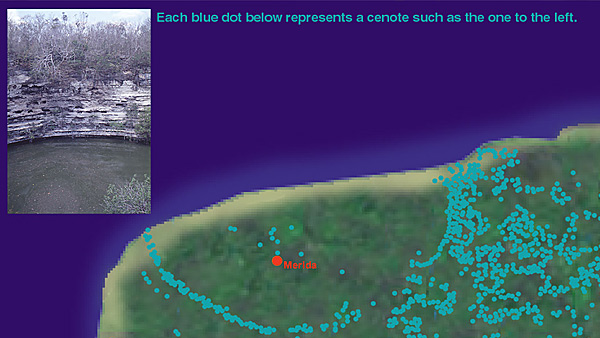| Pollution in Mexico's 'Ring of Cenotes' Causes Breast and Cervical Cancer The Yucatan Times | |
| go to original June 1, 2015 |
|

After seven years of research, a group of scientists from the Regional Research Center Dr. Hideyo Noguchi, of the Schools of Chemistry and Veterinary of the Autonomous University of Yucatan (UADY), concluded that water of the cenotes in the central, east and west parts of the state of Yucatan is highly contaminated with pesticides organochlorines, and this situation is generating a high incidence of cervical cancer and breast cancer among the female population.
In the last decade, Yucatán has ranked among the top states nationwide with these types of cancer. In this regard, the UADY researcher Angel Polanco Rodríguez, said that he has been working since 2007 on two research projects of contaminants in biological and environmental samples:
1) “Study of organochlorine pesticides in blood and breast milk (biomarkers) of women with cancer in the municipalities of highest prevalence in Yucatan”
2) “Water Table Pollution in the area known as The Ring of Cenotes“.
Researchers from the University of Udine, Italy, and the University of Cádiz, Spain were also involved in both research projects.
The conclusion is that 11 municipalities within the state along the zone known as the “Ring of Cenotes” are affected by the presence of organochlorine pesticides, prohibited and restricted by international conventions such as Stockholm and Prague.
These substances belong to the group of pesticides DDT, aldrin, dieldrin, endosulfan, heptachlor, lindane, among others, and its metabolites, considered endocrine disruptors, modify the natural hormonal functions in humans, causing cancer, neurological disorders and other diseases; and obviously these substances are also highly harmful to the environment.
Polanco Rodriguez, who has been working since 2007 examining biological and environmental samples in cenotes, said that these substances are used by farmers and production of backyard gardens to eliminate crop pests and ectoparasites of pigs, cattle and domestic animals.
Regarding the study of organochlorine pesticides in blood and breast milk of infected women with cancer, the researcher said 72 subjects were studied. It was revealed that these people have high levels of pesticides in their blood and breast milk, affecting infants by breastfeeding them with milk containing these dangerous pollutants.
Read the rest at The Yucatan Times
We invite you to add your charity or supporting organizations' news stories and coming events to PVAngels so we can share them with the world. Do it now!
Celebrate a Healthy Lifestyle
 From activities like hiking, swimming, bike riding and yoga, to restaurants offering healthy menus, Vallarta-Nayarit is the ideal place to continue - or start - your healthy lifestyle routine.
From activities like hiking, swimming, bike riding and yoga, to restaurants offering healthy menus, Vallarta-Nayarit is the ideal place to continue - or start - your healthy lifestyle routine.